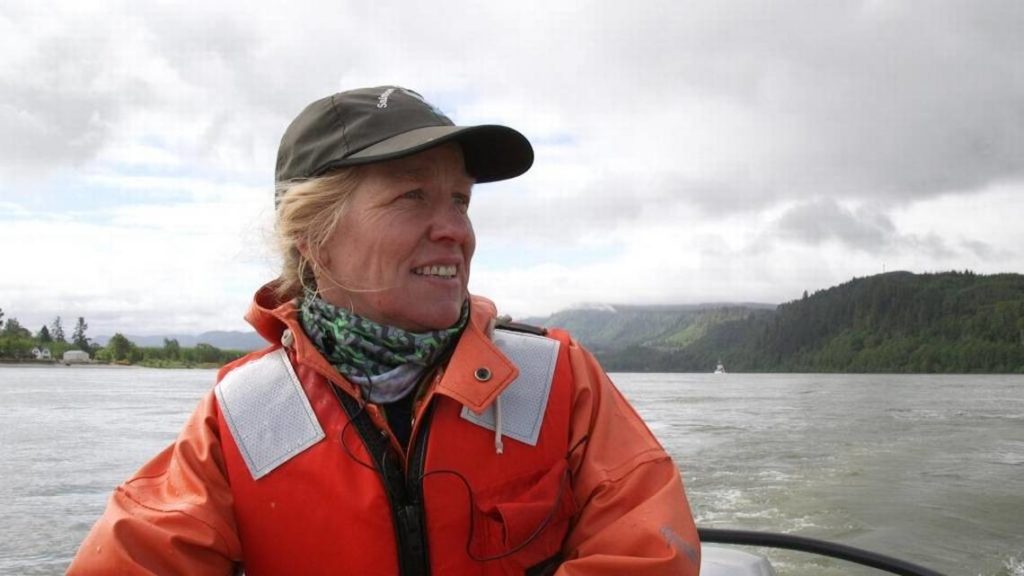Julia A. Sanders died on December 8, 2021 from complications following spleen-removal surgery at University of Washington Medical Center. She was 41.
Known for her exceptional kindness, loyalty, and intellect, Julia is remembered as a steadfast ally and friend, a loving daughter and sister, and a wise, deeply committed advocate for fishing communities facing increasing impacts of climate change.
Julia served as Deputy Director of the National Fisheries Conservation Center (NFCC) and its Global Ocean Health program. In that role she wore many hats: editor of the Ocean Acidification Report and other publications; manager of social media operations; organizer of fundraising events; administrative manager; researcher; public speaker; and advisor to the Working Group on Seafood and Energy, a trade organization representing seafood-dependent communities and businesses.
A gifted writer of epistolary emails, Julia cultivated friends and supporters on behalf of Global Ocean Health, earning a deeply loyal following of her own. “What a fun gal! Feisty courageous spunky daring forgiving smart caring- and so much more- we are going to miss her like crazy,” recalls Anne Kroeker of Seattle, who with her husband Richard Leeds became close friends with Julia. On learning of Julia’s death, Richard wrote: “Tears and tearing of my heart. My utmost sympathy goes out to you and her family at this devastating loss. Sadly losing Julia is the worst loss of these difficult times. Julia was a great person and greatly appreciated. Marine ecosystems and sustainability lost a great benefactor.”
Alyson Myers, a Virginia shellfish grower and nonprofit leader researching potential for sustainable harvest of sargassum overgrowth in the Atlantic, wrote: “Julia was a joy. She was gifted and intelligent, joyful in her work writing about ways to assist our biggest ecosystem, the ocean. She loved researching solutions and those who pursued them.”
“Julia was completely integral to the work of Global Ocean Health, and was loved by many of the people we work with,” said Brad Warren, President of NFCC. “Personally, I feel like I’ve lost an adopted daughter. Julia first came to work with me 20 years ago at Pacific Fishing Magazine, when we hired her to work in the circulation department. She immediately cracked problems in the magazine’s subscription database that had stumped everyone else.” Warren notes that Julia was soon managing circulation, then took over advertising, where she showed a knack for building new relationships and built her skills in sales and marketing. After leaving the magazine, Warren brought her on board for many projects in publishing, research, editing and administration, leading to her role at NFCC.
At NFCC’s Global Ocean Health Program, Julia earned widespread respect among tribes and fishing communities, scientists and sustainability experts as a skilled analyst and advocate. She played a key role in the organization’s work convening experts and practitioners to navigate impacts of ocean acidification, rising temperatures and sea levels, and related challenges. She built and led NFCC’s work with shellfish growers and coastal engineers to increase coastal resilience in shellfish farms. She edited most of NFCC’s publications and proposals. Julia also led real-time modeling of climate policy (using LCPI’s GHG Explorer software) for NFCC’s work with Washington tribes in 2018, which laid the groundwork for passage of the state’s landmark Climate Commitment Act of 2021, widely considered the strongest climate policy in the United States.
Memorial plans will be announced within a few weeks.
To honor Julia’s determination to protect oceans and fisheries, contributions in her memory may be sent to Global Ocean Health, NFCC, PO Box 30615, Seattle WA 98103.
Farewell, Julia Sanders
4


